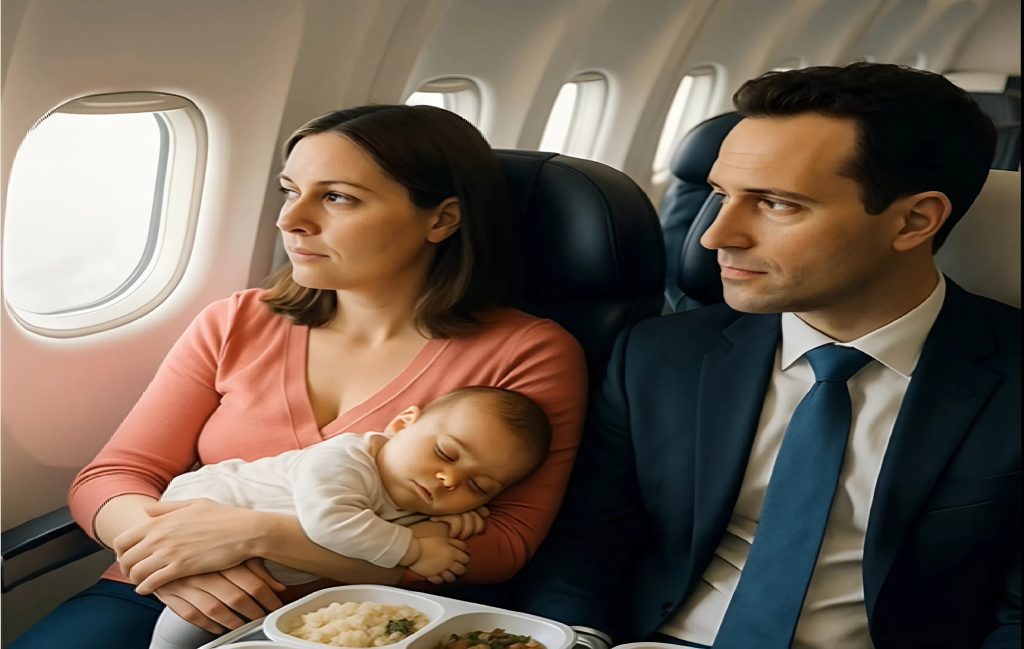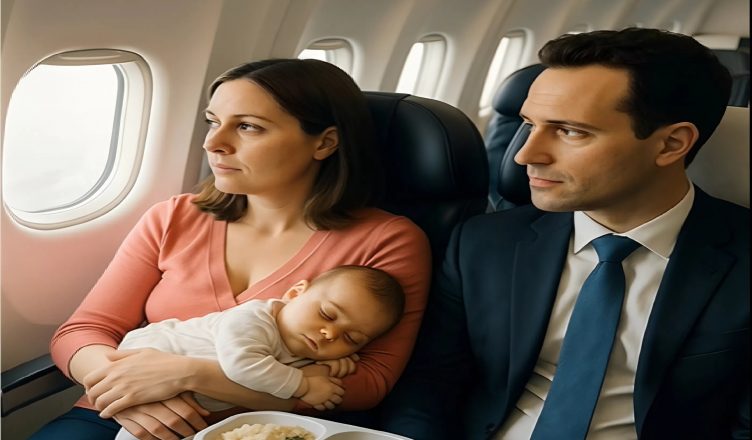The airplane shook as it hit turbulence. The engines roared, the cabin lights flickered slightly, and somewhere behind me, someone tapped their foot in irritation. My baby — only six months old — was crying uncontrollably. At first, it was a soft whimper, then louder, more desperate, like he was trying to outcry the entire sky above us. I tried everything: rocking him, feeding him, singing softly into his tiny ear. Nothing worked. Every minute felt endless.
Passengers began turning their heads. Some sighed loudly, others rolled their eyes. A man across the aisle muttered something under his breath. I could feel sweat trickling down my back as embarrassment and helplessness collided inside me. My baby’s cries grew louder, sharper, cutting through the hum of the engines — and through my heart.
And then… he spoke.
A man in a business suit, maybe in his forties, with the kind of face that had forgotten how to smile. He had been typing on his laptop nonstop until my baby’s wail grew too much to ignore. He snapped his computer shut, turned toward me, and said coldly:
— “Do you really think everyone here wants to listen to that?”
His words hit me like a slap.
— “He’s just a baby… he’s scared,” I whispered.
The man gave a dry, humorless chuckle.
— “Then maybe you shouldn’t fly. There are cars. Trains. Why should the rest of us have to suffer?”
I felt my throat tighten. My face burned. Tears gathered in my eyes as I held my baby closer, his tiny body trembling against mine. I wanted to disappear — to melt into the seat and vanish into the clouds outside.
Then, a movement from behind.
An elderly woman stood up — small, silver-haired, but with a presence that silenced the entire row. She slowly walked toward the man and said, in a calm yet piercing voice:
— “Were you ever a child? Or were you born just like this — impatient and heartless?”
The cabin fell silent. Even the hum of the plane seemed quieter.
The man froze.
The woman turned to me, smiled kindly, and said softly:
— “May I hold him for a moment?”
I nodded, unable to speak. She took my baby gently, sat down, and began to hum a lullaby. Her voice was soft, warm, steady — the kind of sound that feels like a blanket over a frightened soul. Within moments, my baby stopped crying. He looked up at her, wide-eyed, and then — fell asleep, peacefully, on her shoulder.

Tears ran down my cheeks. It wasn’t just kindness. It was grace. It was humanity in its purest form.
The old woman looked at me and said:
— “My dear, never be ashamed of being a mother. People forget they once cried too — when they were small, when they were afraid. Your baby doesn’t make noise. He reminds the world that life still exists.”
The man said nothing for the rest of the flight. I could see him glance our way a few times, his jaw tight, eyes distant. When we finally landed, he stood up, walked over, and… handed me a small chocolate bar. He didn’t speak. But in that simple gesture, I could read everything — regret, humility, maybe even a silent apology.
I smiled.
— “Thank you. He loves chocolate. And I love people who still know how to change.”
That flight changed something in me.
How a baby’s cry — the purest sound of fear and life — could expose the hardness in people’s hearts and still awaken compassion in others. We live in a world where kindness feels like a rare currency, and patience — a lost virtue. But that night, high above the clouds, I learned something powerful: humanity isn’t gone. It’s just sleeping. Waiting for someone to wake it up again.
Now, when my son cries, I don’t feel shame anymore. I feel pride. Because that sound — that tiny, trembling voice — isn’t noise. It’s life itself.
And if anyone ever asks me again,
— “Why is your baby crying?”
I’ll smile and say,
— “Because he’s alive. Are you?”
